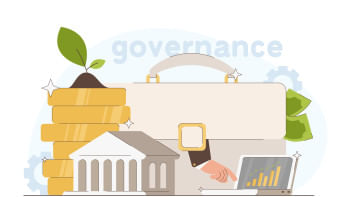A year after the uprising, economic reform is yet to pick up

Bangladesh inherited a fragile economy when the mass uprising ousted the previous regime on August 5, 2024. Economic growth was decelerating, inflation was high, revenue mobilisation was low, and foreign exchange reserves were depleted, which strained the external sector along with low remittance flow. Meanwhile, domestic and foreign investment stagnated, and the banking sector was fragile. When the interim government took office on August 8, 2024, the common citizen had high expectations of the restoration of democratic governance, reform of state institutions, economic stabilisation, and most importantly, holding credible national elections so that people can exercise their voting rights freely.
A year on, while some economic indicators have improved slightly, most remain weak. The economy benefited from macro-financial management measures. Interest rate controls were eased to tighten money supply in the face of high inflation. The government also intervened administratively to curtail inflation. It removed import duties on essential goods, eliminated the requirements for letter of credit (LC) for daily commodities, and lifted borrowing caps for importers of food and fertiliser, to ease supply bottlenecks and prevent inflation from spiralling further.
Inflation started to ease after staying around double digits for over two years. In July 2024, point to point inflation was as high as 11.66 percent which came down to 8.48 percent in June 2025. Growth of GDP for FY2025 has been projected to be 3.97 percent by the Bangladesh Bureau of Statistics (BBS). In FY2024, the GDP growth was 4.22 percent. The underperformance of growth is due to deep-rooted structural problems such as low investment, political uncertainty, supply-side constraints, reduced demand and the absence of fiscal stimulus.
Institutional reform agenda
The interim government's main selling point was initiating reforms in various sectors. Several reform commissions were formed. Though there were no reform commissions on economic issues, a task force was formed to strengthen the BBS to promote data-driven decision making, and the planning adviser formed a task force on "Re-strategising the Economy and Mobilising Resources for Equitable and Sustainable Development." The latter made actionable recommendations for economic growth, social development and environmental sustainability in the short, medium and long terms. The planning adviser handed over the task force report to the chief adviser, expecting that all relevant ministries would implement at least a few of the immediately implementable reform measures. Unfortunately, the government has not shown any interest in that yet.
However, the central bank has formed three task forces to carry out reform measures in the banking sector to improve its ailing condition. The specific objectives of the task forces are to conduct a comprehensive asset quality review of banks, strengthen the capacity and efficiency of Bangladesh Bank (BB) and recover stolen assets and manage non-performing assets of banks. The interim government has approved the Bank Resolution Ordinance 2025, which lays out BB's power to take measures to improve the health of commercial banks. However, the cleaning up of the banking sector will hinge upon the willingness of the future political government to continue the reform measures.
A much-talked-about reform of the National Board of Revenue (NBR) is yet to be implemented. The interim government announced the Revenue Policy and Revenue Management Ordinance, 2025 on May 12, 2025, to restructure and split the revenue authority into two separate entities—the Revenue Policy Division and the Revenue Administration Division. This is a requirement by the International Monetary Fund (IMF) as part of its $4.7 billion loan programme. Also, experts and the private sector have long suggested this to improve tax system efficiency and governance. However, the implementation of the ordinance is currently on hold, pending amendments from the Ministry of Finance.
Agenda for the coming months
With the national elections coming up in February, it is unlikely that the interim government will pursue new reforms. However, in the months leading up to national elections, the interim administration should consolidate what it has gained so far and address the underlying fragility of the economy. Some of these are briefly presented here.
Macroeconomic stability must be restored and maintained. Interim policymakers should continue a prudent interest-rate policy to tame inflation, but the productive sectors should not suffer from a lack of credit. Exchange rate stability will be crucial for higher export income, remittances and investment.
Boosting private investment is critically important for economic growth and employment generation. Unfortunately, investors' confidence has been low during the interim government's tenure because of the weak law and order situation. Besides, structural issues such as policy coherence, regulatory predictability, infrastructural smoothness, technological adoption, and bureaucratic efficiency should be addressed to signal the government's seriousness and mitigate perceived instability.
Fiscal institutions should be upgraded through consensus and inclusive dialogue with all concerned officials. No excuse should stall the NBR reform process and the restructuring ordinance should be amended to allow time-bound transition of the institution, preserve institutional knowledge, and integrate officials into the reform design. Instead of using a top-down approach, the consensus method could improve revenue collection.
Targeted economic relief should be provided for poor and low-income households. Given that inflation is still high and wages have not increased at the same rate, the government should expand social protection—especially cash transfers and food subsidies—to support the vulnerable population. Open market sales of essential commodities should be expanded to include more people.
Export vulnerabilities should be mitigated through strategic actions. Diversification of export items and destinations has become more important than ever before in the context of high US tariffs and the expected graduation from the Least Developed Country (LDC) category in November 2026. The government should provide policy support to exporters and improve the business environment to boost their competitiveness in the global market.
The resilience of the financial sector should be strengthened. The ongoing banking reform measures to address non-performing loans, improve the health of distressed banks through mergers and adopt strong governance and transparency initiatives should be expedited and continued. Independent oversight and audit capabilities should be strengthened to restore credibility and unlock lending space for the private sector.
The government should prepare for the post-election transition. The independent status of key economic institutions—central bank, NBR, finance ministry—should be retained. Legal protections against undue politicisation should be embedded and a seamless transition to a democratically elected government should be enabled with intact reform momentum.
Despite the interim government's success in several areas, economic and institutional weaknesses prevail, and poor governance overshadows the early euphoria among common people. The government struggled to translate ideas into credible practice, and its capability waned in the public eye as the inner weaknesses became clearer over time. Between now and the next elections, the interim government has both an opportunity and an obligation to pivot by delivering measurable institutional and economic progress and reclaiming moral authority.
Dr Fahmida Khatun is executive director at the Centre for Policy Dialogue.
Views expressed in this article are the author's own.
Follow The Daily Star Opinion on Facebook for the latest opinions, commentaries and analyses by experts and professionals. To contribute your article or letter to The Daily Star Opinion, see our guidelines for submission.


 For all latest news, follow The Daily Star's Google News channel.
For all latest news, follow The Daily Star's Google News channel. 








Comments